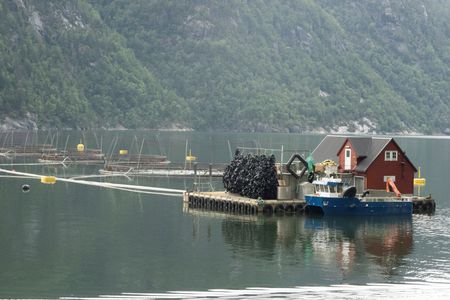By Francesco Canepa and Terje Solsvik
OSLO (Reuters) -Sitting in his lakeside villa in the Swiss city of Lucerne, Borger Borgenhaug misses his grandchildren and the smell of the Nordic sea on a clear summer night.
The carpenter turned real-estate tycoon says that is the price he pays to escape Norway’s beefed-up wealth tax – an annual levy that has driven hundreds of millionaires abroad while underpinning one of the world’s most equal societies.
“The political climate in Norway has become increasingly hostile to business owners,” Borgenhaug, who left in 2022, told Reuters.
With a wealth tax dating back to 1892 and a culture of openness that allows citizens to view the tax returns of others, Norway has more experience than most in squeezing the rich. Its model offers lessons for countries debating similar moves, from Britain to France and Italy, or even a city like New York.
The takeaway: a wealth tax will scare off some millionaires, but if set broadly enough, revenues can still be worth it.
EXODUS OF THE WEALTHY
The tax was a defining issue in Norway’s election in September, which returned the Labour Party to power. The party had raised the levy and tightened exit rules during its previous term.
Individuals pay 1% on net wealth between 1.76 million and 20.7 million crowns ($174,000–$2 million) and, since 2022, 1.1% above that. Exactly 671,639 people – about 12% of the population – paid in 2023.
Main homes enjoy a 75% discount on assessed value; shares and commercial property get 20%. Assets abroad are included, but debt is deductible.
Leaving Norway triggers an exit tax of 37.8% on unrealised capital gains above 3 million crowns – such as notional gains on shares that have gone up in value but are yet to be sold. Loopholes that allowed emigrants to defer payment indefinitely were closed in 2024.
The changes turned a trickle into a stream. Data from conservative think-tank Civita shows 261 residents with assets above 10 million crowns ($973,000) left in 2022 and 254 in 2023 – more than double the typical rate before the hike.
Business magazine Kapital’s ranking of Norway’s 400 richest people shows 105 now live abroad or have transferred wealth to relatives who do. Some of their pictures hang on a “wall of shame” in the offices of the small, opposition Socialist Left party.
THE CASE FOR: EQUALITY AND REVENUE
Supporters argue the tax acts as a redistributive backstop in a country that scrapped inheritance tax in 2014 and ranks among the world’s wealthiest thanks to oil, shipping and fisheries.
Norway funnels all proceeds from its oil and gas industry into a sovereign wealth fund and caps annual withdrawals at 3% of the fund’s value under a self-imposed fiscal rule.
This means it needs to find other sources of revenue.
“The wealth tax makes the overall personal tax system more progressive than income tax alone,” Deputy Finance Minister Ellen Reitan told Reuters.
Revenue from it has climbed despite the exodus and now sits at 0.6% of GDP — not a trivial sum. For context, Britain’s Labour government is hunting for savings of a similar magnitude to help hit its fiscal targets.
Research by Norway’s statistics office shows entrepreneurs have enough liquidity to pay, and that the burden falls overwhelmingly on the richest. Another study suggests the tax may spur investment in human capital.
Norway remains among the world’s most equal countries and ranks high for ease of doing business.
“These findings suggest that the wealth tax does not straightforwardly hinder firm-level investment or employment,” said Robert Iacono, professor at the Norwegian University of Science and Technology (NTNU).
A poll by the Response agency for the daily Aftenposten taken just before September’s election showed 39% of Norwegians wanted the wealth tax maintained or raised, while 23% wanted to see a reduction and 28% called for abolition.
Norway’s Labour government wants a grand bargain on tax reform over the next two years, inviting all parties to the table. The catch? The wealth tax stays — in some shape or form.
THE CASE AGAINST: CAPITAL DRAIN AND STARTUP CHILL
Critics say the model penalises domestic ownership and risks hollowing out Norway’s entrepreneurial base.
“The wealth tax system makes it harder for companies to compete with the rest of the world,” said Knut-Erik Karlsen, who made his fortune in fish oil supplements and recently moved to Switzerland.
Norway taxes capital gains, unlike Switzerland, and imposes higher levies on labour than the OECD average.
Around 40% of emigrants are business owners, according to Princeton researcher Christine Blandhol, who estimates the latest tax changes will cut Norway’s output by 1.3% over the long run. Others find the tax hampers firms’ performance.
A wealth levy is especially painful for startup founders, who pay on capital long before profits arrive.
Are Traasdahl left Norway in 2000 to market Europe’s mobile technology in the U.S., later founding and selling several tech firms including the app now known as iHeartRadio.
“There’s no chance I would have been able to build in Norway what I built in the United States,” he said.
Norway has one of Europe’s lowest levels of venture capital as a share of GDP – at half that of Sweden’s and far behind the U.S., OECD data shows.
Heirs often leave before taking control of shares. Laurence Odfjell, now in Singapore, says staying may have cost him control of his shipping group during the downturn that followed the global financial crisis of 2008.
“I was not going to let our company sink on my watch due to not having the capital,” he said.
CAN IT BE REPLICATED OR IS IT UNIQUELY NORWEGIAN?
So far, no new country is going down the Norwegian route.
French lawmakers binned a headline-grabbing 2% levy on fortunes above 100 million euros, settling instead for a narrower charge on personal assets parked in holding companies – a measure forecast to raise barely 1 billion euros.
Across the Channel, Britain’s Labour government has ruled out a formal wealth tax but insists it will keep leaning on those “with the broadest shoulders”.
Italy, for its part, remains allergic to inheritance hikes yet is quietly tightening its flat regime for wealthy foreigners.
Meanwhile, millionaires are still voting with their feet. Norway is on track to shed another 150 this year – a sizeable outflow for a country of just 5.6 million – according to Henley & Partners, which advises wealthy clients on relocation, and New World Wealth, which draws on public sources including LinkedIn.
Britain tops the global list with 16,500 expected departures after scrapping tax breaks for foreign residents. The UAE, U.S. and Italy are among the biggest gainers.
Norway’s social cohesion and oil wealth may make its model hard to copy. But economists say it shows that any such levy involves a trade-off with economic and political dimensions.
“Not having a wealth tax leads to greater inequality, having one means less capital for startups,” NTNU’s professor Iacono said. “Politics needs to strike a balance.”
($1 = 10.2757 Norwegian crowns)
(Writing by Francesco Canepa in Frankfurt; Editing by Mark John and Alison Williams)











